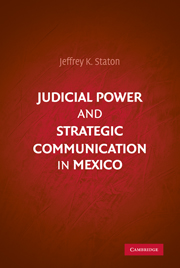Book contents
- Frontmatter
- Contents
- List of Tables
- List of Figures
- Acknowledgments
- PART I JUDICIAL COMMUNICATION AND JUDICIAL POWER
- PART II THE POLITICS OF CONSTITUTIONAL REVIEW IN MEXICO
- PART III RELATIONSHIPS BETWEEN TRANSPARENCY AND LEGITIMACY
- 5 Constitutional Review and the Development of Judicial Legitimacy
- 6 A Cross-National Analysis of Judicial Legitimacy
- 7 Democratic States and the Development of Judicial Power
- References
- Index
6 - A Cross-National Analysis of Judicial Legitimacy
from PART III - RELATIONSHIPS BETWEEN TRANSPARENCY AND LEGITIMACY
Published online by Cambridge University Press: 06 July 2010
- Frontmatter
- Contents
- List of Tables
- List of Figures
- Acknowledgments
- PART I JUDICIAL COMMUNICATION AND JUDICIAL POWER
- PART II THE POLITICS OF CONSTITUTIONAL REVIEW IN MEXICO
- PART III RELATIONSHIPS BETWEEN TRANSPARENCY AND LEGITIMACY
- 5 Constitutional Review and the Development of Judicial Legitimacy
- 6 A Cross-National Analysis of Judicial Legitimacy
- 7 Democratic States and the Development of Judicial Power
- References
- Index
Summary
This chapter tests the empirical implications developed in Chapter 5. This requires cross-national data on beliefs in high court legitimacy. To date, the GCB study represents the only systematic cross-national analysis in which scholars use a precise measure of the judicial legitimacy concept targeted at the highest appellate court of a state. The regression analysis that follows makes use of the publicly available survey information from their study. I conclude the chapter by discussing implications for understanding the relationship between transparency and legitimacy and for the role of strategic deference in the construction of judicial power.
HYPOTHESES AND DATA
The available, individual level measures of legitimacy beliefs derive from public opinion surveys conducted in Bulgaria, Poland, Russia, Spain, France, Hungary, and the United States in 1995. This accounts for 40 percent of the states in the original analysis (see Cohn, White, and Sanders 2000 for details). Although limited, the data establish a difficult test for the argument. Even the full data set only includes European and North American states. With the possible exception of Russia, these are not political contexts we typically associate with imposing severe costs on judges for overly active behavior. There is no Argentina here, no Venezuela, no Zimbabwe. Empirically, the upper bound of any indicator of political constraints on judging may not be very high – we may not capture the cases that will allow us to uncover the conditionality anticipated by the model.
- Type
- Chapter
- Information
- Judicial Power and Strategic Communication in Mexico , pp. 167 - 195Publisher: Cambridge University PressPrint publication year: 2010



